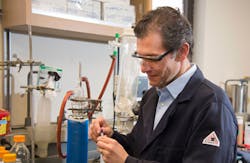A new process developed at Purdue University converts lignin, once considered a biomass waste product, into valuable chemical commodities.
Researchers at Purdue's Center for Direct Catalytic Conversion of Biomass to Biofuels, or C3Bio, say that their method can turn lignin into lucrative chemical products with a variety of uses.
"We are able to take lignin — which most biorefineries consider waste to be burned for its heat — and turn it into high-value molecules that have applications in fragrance, flavoring and high-octane jet fuels," explained Mahdi Abu-Omar, who led the team at C3Bio.
"We can do this while simultaneously producing from the biomass lignin-free cellulose, which is the basis of ethanol and other liquid fuels. We do all of this in a one-step process," Abu-Omar added.
The process starts with untreated chipped and milled wood from sustainable poplar, eucalyptus or birch trees, Purdue University said. A catalyst is added to initiate and speed the desired chemical reactions, followed by a solvent to help dissolve and loosen up the materials. The resulting mixture is heated in a pressurized reactor for several hours, breaking up the lignin molecules and producing lignin-free cellulose and a liquid stream that contains the solvent (which is evaporated and recycled) and two phenols, a class of aromatic hydrocarbon compounds used in perfumes and flavorings.
An additional process uses another catalyst to convert the two phenol products into high-octane hydrocarbon fuel that can be used as drop-in gasoline.
Next, the researchers plan to look in more detail at how the catalyst can be recycled efficiently, along with ways to scale up the whole process, Abu-Omar said.
"A biorefinery that focuses not only on ethanol, but on other products that can be made from the biomass is more efficient and profitable overall," he pointed out. "It is possible that lignin could turn out to be more valuable than cellulose and could subsidize the production of ethanol from sustainable biomass."
